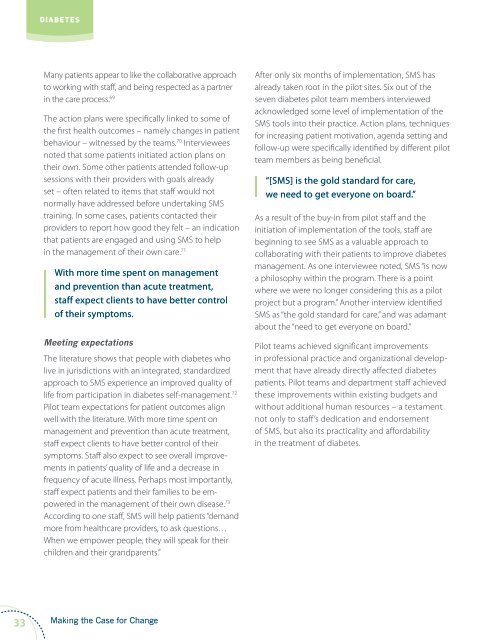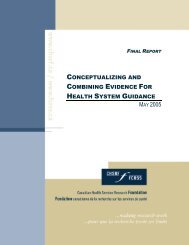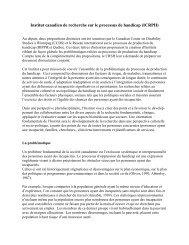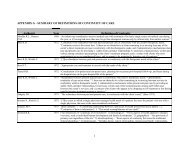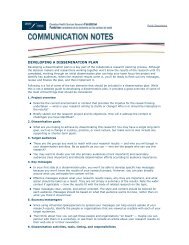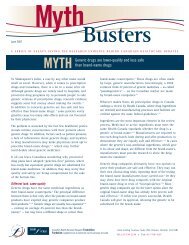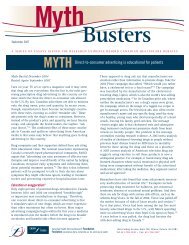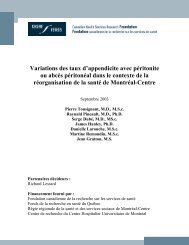Full Report
Full Report
Full Report
Create successful ePaper yourself
Turn your PDF publications into a flip-book with our unique Google optimized e-Paper software.
DIABETES<br />
Many patients appear to like the collaborative approach<br />
to working with staff, and being respected as a partner<br />
in the care process. 69<br />
The action plans were specifically linked to some of<br />
the first health outcomes – namely changes in patient<br />
behaviour – witnessed by the teams. 70 Interviewees<br />
noted that some patients initiated action plans on<br />
their own. Some other patients attended follow-up<br />
sessions with their providers with goals already<br />
set – often related to items that staff would not<br />
normally have addressed before undertaking SMS<br />
training. In some cases, patients contacted their<br />
providers to report how good they felt – an indication<br />
that patients are engaged and using SMS to help<br />
in the management of their own care. 71<br />
With more time spent on management<br />
and prevention than acute treatment,<br />
staff expect clients to have better control<br />
of their symptoms.<br />
Meeting expectations<br />
The literature shows that people with diabetes who<br />
live in jurisdictions with an integrated, standardized<br />
approach to SMS experience an improved quality of<br />
life from participation in diabetes self-management. 72<br />
Pilot team expectations for patient outcomes align<br />
well with the literature. With more time spent on<br />
management and prevention than acute treatment,<br />
staff expect clients to have better control of their<br />
symptoms. Staff also expect to see overall improvements<br />
in patients’ quality of life and a decrease in<br />
frequency of acute illness. Perhaps most importantly,<br />
staff expect patients and their families to be empowered<br />
in the management of their own disease. 73<br />
According to one staff, SMS will help patients “demand<br />
more from healthcare providers, to ask questions…<br />
When we empower people, they will speak for their<br />
children and their grandparents.”<br />
After only six months of implementation, SMS has<br />
already taken root in the pilot sites. Six out of the<br />
seven diabetes pilot team members interviewed<br />
acknowledged some level of implementation of the<br />
SMS tools into their practice. Action plans, techniques<br />
for increasing patient motivation, agenda setting and<br />
follow-up were specifically identified by different pilot<br />
team members as being beneficial.<br />
“[SMS] is the gold standard for care,<br />
we need to get everyone on board.”<br />
As a result of the buy-in from pilot staff and the<br />
initiation of implementation of the tools, staff are<br />
beginning to see SMS as a valuable approach to<br />
collaborating with their patients to improve diabetes<br />
management. As one interviewee noted, SMS “is now<br />
a philosophy within the program. There is a point<br />
where we were no longer considering this as a pilot<br />
project but a program.” Another interview identified<br />
SMS as “the gold standard for care,” and was adamant<br />
about the “need to get everyone on board.”<br />
Pilot teams achieved significant improvements<br />
in professional practice and organizational development<br />
that have already directly affected diabetes<br />
patients. Pilot teams and department staff achieved<br />
these improvements within existing budgets and<br />
without additional human resources – a testament<br />
not only to staff’s dedication and endorsement<br />
of SMS, but also its practicality and affordability<br />
in the treatment of diabetes.<br />
33<br />
Making the Case for Change


